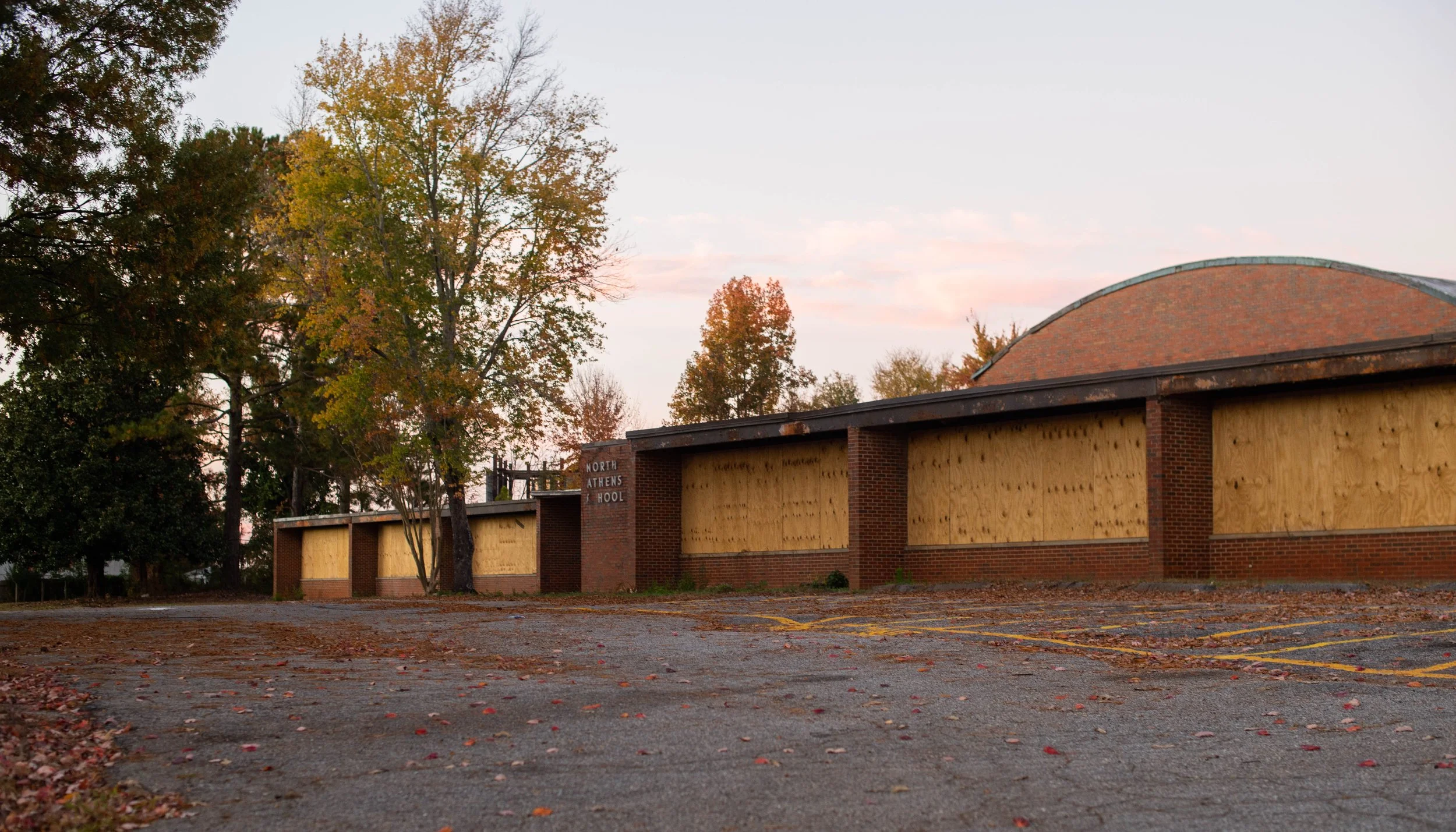Athens Area Homeless Encampments to be Relocated to a Permanent Facility
By Julian Alexander
The North Athens School is seen on Monday, Nov. 15, 2021 on Barber Street in Athens, Georgia. The disused building is slated to become a permanent encampment for the homeless population of Athens, and it will include services such as running water and electricity. (Photo/ Julian Alexander)
As the leaves start to fall in Athens, so has the curtain separating urban homeless encampments from public view. Just east of downtown, a drive along Willow Street will reveal numerous encampments dotting the woods.
While cooler temperatures pose a risk to the homeless population of Athens, they face a graver threat: forced relocation. In the current landscape, there is nowhere for these residents to go. As a remedy, Athens-Clarke County has stepped in to provide a government-sponsored encampment on county property.
According to the Athens-Clarke County ordinance which laid the groundwork for the camp, the 2020 Point-In-Time count placed the unsheltered population - those who are unable or unwilling to be housed in current shelters - at 67 people.
Local ordinance dictates that no one shall camp or sleep in a vehicle on public land without a permit. Further, no one may abandon a vehicle. This shuts the door of public lands to unsheltered members of the community, and makes it impossible for homeless individuals who own a vehicle to use it for shelter.
In the county with the smallest landmass in Georgia, there are few other places for homeless members of the community to go. The unsheltered population is caught in a catch-22: they cannot camp on private property or risk arrest for trespass, and they cannot camp on public property or they face a similar fate.
Map showing homeless shelters (blue) and the current major encampment along Willow Street (green). The North Athens School campus, where the population will be relocated, is marked in red.
The homeless population has always been present in Athens-Clarke County, but in recent years the population has become more visible as underbrush has been cut down and the encampments contained within them have grown. According to data provided by the county, the unsheltered homeless population has grown by 21% in recent years.
“In last several years, as the Department of Transportation has done a lot of forest clearing, a lot of the encampments have moved closer into town and just become more visible,” said Mayor Kelly Girtz.
As camps have become more visible, more and more grumblings have been heard around town about the homeless population. Many residents see homelessness as a problem that needs to be solved, but they fail to see the many challenges facing the community.
Homelessness is a multifaceted issue, but members of the community feel one of the primary concerns is safety. Unsheltered persons have no permanent place to store their belongings, and often experience theft from other members of the community. The North Athens School camp will provide some of the essential services the unsheltered population needs to gain a foothold.
“So out of the gate, [the camp will be] a place to legally be first and foremost. And secondly, [it will be] a place that is going to be safe,” Girtz said.
Funding will be provided in part through Federal funds, though the scope of the project has been scaled back from its initial proposal. There are concerns that the camp will not adequately meet the needs of the community.
“Because it's publicly funded, there's going to be rules, and there's going to be stipulations and things you can and can't do. Whereas in the current [encampment], then they can do whatever they want - they can take drugs, they can have a campfire, there's all sorts of things they can do, that they won't be able to do in the, the funded encampment,” said Steven Mason, executive director of Bigger Vision, an emergency shelter located along North Avenue.
Ultimately, the county hopes to house the homeless residents. In the long term the county would like to seek out more permanent solutions using funding from the American Rescue Plan Act. Girtz sees the issue as one that is closely tied to the current state of the market, as well as the pandemic.
A portion of the Pilgrim’s chicken processing plant is seen on Monday, Nov. 15, 2021 off Barber Street in Athens, Georgia. The plant is adjacent to the now disused North Athens School building, which is slated to become a permanent encampment for the homeless population of Athens, and it will include services such as running water and electricity. (Photo/ Julian Alexander)
“Right now, there really is a lack of permanent affordable housing. And then, of course, that gets exacerbated by specific elements of the sort of pandemic era economy,” Girtz said.
In the future, Girtz hopes to work with developers to help house the community by providing affordable units.
“The incentive will be that you get a density bump, as a developer, by installing some permanently affordable units in those properties. So that's a good model, because you're taking place where nobody was living at all, and converting that into housing,” said Girtz of redevelopment of existing properties unused for homelessness.
Girtz sees the problem as solvable.
“Everybody who is in the state of homelessness, at some point, have that first night of homelessness, when usually a series of things have gone wrong, or badly,” Girtz said.
They just need a foothold.



